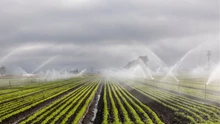
Organic farming has gained significant popularity worldwide due to its focus on sustainability and health-conscious agricultural practices. A key aspect of this movement is organic seed production. The seeds produced or adapted for organic agriculture, grown under conditions adhering to organic farming principles. These seeds do not contain residues of chemical fertilizers, pesticides, or GMOs, promoting healthier crops and ecosystems.
Benefits of Organic Seed Production
-
Environmental Conservation: Organic seed production enhances soil fertility, reduces erosion, and conserves water resources. For example, using cover crops like legumes (such as clover and vetch) improves soil structure and fertility without synthetic inputs. Additionally, incorporating composted chicken manure increases soil organic matter, improving nutrient availability.
-
Healthier Crops and Consumers: By avoiding synthetic chemicals, organic seeds yield crops free from harmful residues, ensuring healthier food products. For instance, organic tomatoes are grown without chemical pesticides, reducing health risks for consumers. Another example is planting beans with corn, which supports nitrogen fixation and weed suppression naturally.
-
Supports Sustainable Agriculture: Organic seed production promotes natural farming methods, supporting long-term agricultural sustainability. Crop rotation and companion planting are examples of practices that reduce pests and diseases naturally, minimizing reliance on chemical controls.
Steps Involved in Organic Seed Production
1. Seed Selection and Preparation
-
Choosing Suitable Varieties: Select local varieties adapted to organic farming conditions, like heirloom tomatoes for flavor and adaptability. Another example is selecting disease-resistant varieties to reduce the need for chemical treatments.
-
Seed Treatment: Treat seeds with organic-approved substances, e.g., neem oil for pest control and seaweed extract for growth promotion.
2. Field Preparation
-
Soil Management: Enhance soil fertility with compost and green manure. Mulching with straw is another example that suppresses weeds and retains soil moisture naturally.
-
Weed Management: Use mulching and hand weeding. For instance, using landscape fabric suppresses weeds effectively in organic carrot production.
3. Sowing and Crop Management
-
Planting: Ensure proper spacing and depth. Planting lettuce in succession is an example that maximizes yield without overcrowding.
-
Irrigation and Nutrient Management: Use drip irrigation and organic fertilizers. Applying compost tea is another example that boosts soil nutrients and microbial activity.
4. Pest and Disease Management
-
Biological Controls: Introduce beneficial insects like ladybugs to control aphids in organic lettuce production. Another example is using nematodes to control soil pests naturally.
-
Organic Sprays: Use garlic spray for fungal diseases. Garlic extract sprayed on tomatoes prevents early blight effectively.
5. Harvesting and Seed Processing
-
Timing: Harvest at maturity. Collecting lettuce seeds when pods turn brown ensures seed viability.
-
Processing: Clean and dry seeds naturally. Air-drying pepper seeds preserves seed quality and germination rates.
6. Seed Certification
-
Certification Process: Seek organic certification. Organic certification agencies verify compliance with organic standards.
-
Traceability: Maintain records for traceability. Keeping detailed logs of planting dates and inputs ensures transparency.
Challenges in Organic Seed Production
-
Limited Availability: Some organic seed varieties may be less accessible. Rare heirloom varieties may require sourcing from specialized seed banks.
-
Higher Costs: Initial investment in organic inputs and certification can be costly. Organic certification fees vary based on farm size and location.
-
Technical Expertise: Requires knowledge of organic farming practices. Training in soil health management supports successful organic crop production.













